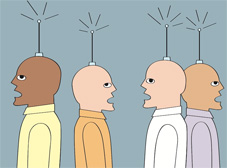
BTs, Breslev, and Brainwash
You'd be hard-pressed to find a baal teshuva (newly observant Jew, or "BT") who hasn't been accused of being 'brainwashed' at some point in their life...

You’d be hard-pressed to find a baal teshuva (newly observant Jew, or “BT”) who hasn’t been accused of being ‘brainwashed’ at some point in their life, by people who weren’t so impressed by ideas about there being a Creator of the world etc.
But while this term is regularly thrown about and abused, do you know what it actually takes to ‘brainwash’ someone against their will? Nope, didn’t think so. Neither did I – so I decided to go and research it.
G-d took me to a site called ‘How Stuff Works’, and this is what I learned:
Brainwashing hit the headlines big time after the Korean War in the 1950s, when some American POWs had been so badly brainwashed in captivity, they didn’t even want to be repatriated to the States. But enforced ‘re-education’ has been going on for more than a century, particularly in Communist countries like the former USSR and Red China.
 So how does it work?
So how does it work?
The site explained that a psychologist called Robert Jay Lifton worked with a bunch of former Korean POWs in the late 1950s to define the steps required to successfully brainwash someone. These are:
- Assault on identity
- Guilt
- Self-betrayal
- Breaking point
- Leniency
- Compulsion to confess
- Channeling of guilt
- Releasing of guilt
- Progress and harmony
- Final confession and ‘rebirth’
We can sum it up like this: the first four steps are all about breaking the person down. They are told (usually in isolation, or in front of a group of their peers) that they’re bad, that everything they do is bad, that everything they think is bad, that they’re the scum of the earth. After weeks, months, and even years of this sort of verbal and emotional battery, and even physical torture, the victim starts to believe it: “It’s true, I’m bad!” he tells himself. He can’t do anything right, and even the stuff he does do is worthless and evil.
Sooner or later, he reaches his breaking point, which in the common parlance is called having a ‘nervous breakdown’. At this stage, he has no idea who he is, what he wants, what’s good, what’s bad. His identity is completely up for grabs, which takes us on to the next stage: “change the way you think, agree with us, and you’ll start to feel much better…”
In this intermediary stage, the victim will be treated better (that is, not verbally and physically assaulted every second of the day) – and this contrast is what actually breaks him.
In the last four stages, the person is so emotionally and spiritually broken, he will do anything to be accepted and liked and treated ‘nicely’ again. Mentally, he’s a blank slate, and he’ll accept whatever he’s being told, and give away his ‘old persona’ in order to be ‘reborn’ a miserable victim of successful brainwashing.
If these techniques sound like what’s going on in your group, organization or social circle then you certainly should leave right away (and call the police), because you’re definitely being brainwashed!
Thank G-d, authentic Judaism knows that free choice is the most important thing in the world; it’s the whole reason why G-d created the world. Rebbe Nachman himself wrote that it was within his power to turn all of his students into perfect Tzaddikim, just like himself. But he wouldn’t do it, because then it would be ‘as though G-d was serving Himself.’
And G-d values our free-choice more than anything else.
Something else you should know, is that authentic Breslev is all about finding our good points, and building up the good in us. If you’re hanging out with people where all they do is nitpick and criticize your religious observance or personal traits, or in a place where people are routinely and publicly humiliated and mocked for not being ‘perfect people’, or for having issues, or for making mistakes (like we all do) – you should run for the hills.
Even if you’re not being classically brainwashed (and depending on the circumstances, that could be a pretty big if…) – breaking a person down, destroying a person’s ego, or shaming them into feeling guilty, or bad, or never good enough, is not just not a Jewish idea, it’s the complete antithesis of Yiddishkeit generally, and Breslev in particular.
You know why I love Breslev so much? Because when I hit Rebbe Nachman and his teachings, it was the first time I started to see that I had so much good inside myself. Every time I hit a ‘down’ and started beating myself up for sinning or not being perfect, my Breslev spiritual guide would set me straight and inform me in no uncertain terms: G-d loves you! Exactly how you are! Just stand back up, and carry on. There’s still everything to play for!
And I believed him.
Maybe that is Breslev ‘brainwashing’, who knows. But if it is, I, for one, can’t get enough of it.












Tell us what you think!
Thank you for your comment!
It will be published after approval by the Editor.